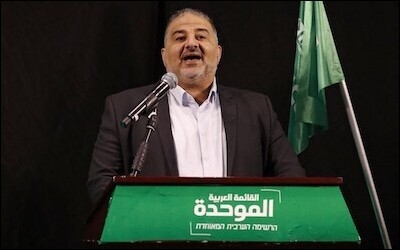by Gregg Roman
A unique opportunity has arisen from Israel's political gridlock and the watershed moment provided by Abbas.
 Mansour Abbas, head of the Israeli Arab Islamist Ra'am Party, pledged to "courageously champion a vision of peace, mutual security, partnership and tolerance" among Israelis in an April 1 speech. |
Israelis across the nation tuned in on April 1 to hear Mansour Abbas, head of the Arab Islamist Ra'am Party, give a live televised address. After breaking from the Arab Joint List and declaring its willingness to support whichever of Israel's two main political blocs offered it the best deal, Ra'am won four seats in Israel's March 23 elections, the fourth in two years of political deadlock. As it turned out, neither Prime Minister Benjamin Netanyahu nor his rivals won enough seats to form a government without Ra'am's blessing.
But both sides had reservations about Abbas, who had spent most of his political career loudly criticizing Zionism. Until now. Describing himself as "a proud Arab and Muslim, a citizen of the state of Israel who heads the leading, biggest political movement in Arab society," Abbas pledged in Hebrew to "courageously champion a vision of peace, mutual security, partnership and tolerance" among Israelis.
Abbas had spent most of his political career loudly criticizing Zionism. |
Some on Israel's religious Right complained that he did not swear allegiance to Israel as a Jewish and democratic state. But neither did he once utter the word "Palestinian," and that put him a world apart from the leaders of other Israeli Arab political parties, who have encouraged their community to join Palestinians in rejecting the legitimacy of Israel as a Jewish and democratic state. Many self-identify as Palestinians rather than Israelis. "There is no such thing as Arab Israeli. We are Palestinian Arabs," leading former MK Masoud Ganaim complained after the speech.
But the "Palestinianization" of large parts of the Israeli-Arab community has been a bust in terms of improving its welfare. Israeli Arab communities are suffering from high crime rates, housing shortages and other maladies.
Abbas essentially acknowledged that Israeli Arabs must accept that Israel as a Jewish state is here to stay. |
Abbas essentially acknowledged that Israeli Arabs must accept that Israel as the national homeland of the Jewish people is here to stay and work within the system to advance their communal interests. This kind of thinking has been compared to that of Jewish ultra-Orthodox parties, which are not enthusiastic proponents of Zionism but have long understood the need for acceptance and accommodation with the secular state.
The response among Jewish Israelis on both sides of the political divide has been electrifying, if far from unanimous. Until now, Israeli governing coalitions have generally avoided depending on the political support of Arab parties. Now, it is being welcomed by many as not only necessary to escape the country's political deadlock but as a potentially transformative watershed.
If Ra'am's accommodation with the Israeli political mainstream brings real results in meeting the needs of its constituents, rejectionism in Israeli Arab society will recede and other Arab parties are likely to follow suit. The fact that an Islamist party is leading the way will give moderation and compromise more cachet on the Arab street, because it will not be seen as giving up on Arab cultural traditions and heritage.
This could have a knock-on effect among Palestinians on the other side of the Green Line. The Palestinian Authority will lose the unfailing and unflinching support of what it calls the "1948 Arabs" for its rejectionist policies, while ordinary Palestinians will witness up close what can be gained through cooperation with Israel, rather than continuing conflict and bloodshed.
A unique opportunity has arisen from Israel's political gridlock and the watershed moment provided by Abbas. |
This process will reinforce and be reinforced by the trend toward normalization in the broader Middle East, where the new divide is not between Arabs and Jews, but between those attracted to accommodation with the Jewish state and those who cling to their quixotic antagonisms. But it must begin with Jewish and Arab Israelis alike seizing the unique opportunity that has arisen from the country's political gridlock and the watershed moment provided by Mansour Abbas.
Gregg Roman is director of the Middle East Forum. Follow him on Twitter and Facebook.
Source: https://www.meforum.org/62197/could-raam-be-a-middle-east-game-changer
No comments:
Post a Comment